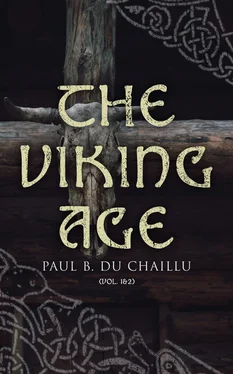The Veneti, a tribe who inhabited Brittany, and whose power on the sea is described by Cæsar, were in all probability the advance-guard of the tribes of the North; their ships were built of oak, with iron nails, just as those of the Northmen; and the people of the country in which they settled were not seafaring. 5Moreover, the similarity of the name to that of the Venedi, who are conjecturally placed by Tacitus on the shores of the Baltic, and to the Vends, so frequently mentioned in the Sagas, can scarcely be regarded as a mere accident.
“The Veneti have a very great number of ships, with which they have been accustomed to sail to Britain, and excel the rest of the people in their knowledge and experience of nautical affairs; and as only a few ports lie scattered along that stormy and open sea, of which they are in possession, they hold as tributaries almost all those who have been accustomed to traffic in that sea. …”
“For their own ships were built and equipped in the following manner: Their ships were more flat-bottomed than our vessels, in order that they might be able more easily to guard against shallows and the ebbing of the tide; the prows were very much elevated, as also the sterns, so as to encounter heavy waves and storms. The vessels were built wholly of oak, so as to bear any violence or shock; the cross-benches, a foot in breadth, were fastened by iron spikes of the thickness of the thumb; the anchors were secured to iron chains, instead of to ropes; raw hides and thinly-dressed skins were used for sails, either on account of their want of canvas and ignorance of its use, or for this reason, which is the more likely, that they considered that such violent ocean storms and such strong winds could not be resisted, and such heavy vessels could not be conveniently managed by sails. The attack of our fleet on these vessels was of such a nature that the only advantage was in its swiftness and the power of its oars; in everything else, considering the situation and the fury of the storm, they had the advantage. For neither could our ships damage them by ramming (so strongly were they built), nor was a weapon easily made to reach them, owing to their height, and for the same reason they were not so easily held by grappling-irons. To this was added, that when the wind had begun to get strong, and they had driven before the gale, they could better weather the storm, and also more safely anchor among shallows, and, when left by the tide, need in no respect fear rocks and reefs, the dangers from all which things were greatly to be dreaded by our vessels.”
Roman writers after the time of Tacitus mention warlike and maritime expeditions by the Saxons and Franks. Their names do not occur in Tacitus, but it is not altogether improbable that these people, whom later writers mention as ravaging every country which they could enter by sea or land, are the people whom Tacitus knew as the Sueones.
The maritime power of the Sueones could not have totally disappeared in a century, a hypothesis which is borne out by the fact that after a lapse of seven centuries they are again mentioned in the time of Charlemagne; nor could the supremacy of the so-called Saxons and Franks on the sea have arisen in a day; it must have been the growth of even generations before the time of Tacitus.
Ptolemy (circ. A.D. 140) is the first writer who mentions the Saxons as inhabiting a territory north of the Elbe, on the neck of the Cimbric Chersonesus. 6They occupied but a small space, for between them and the Cimbri, at the northern extremity of the peninsula, he places ten other tribes, among them the Angli.
About a century after the time of Ptolemy, Franks and Saxons had already widely extended their expeditions at sea. Some of the former made an expedition from the Euxine, through the Mediterranean, plundered Syracuse, and returned without mishap across the great sea (A.D. circ. 280). 7
“He (Probus) permitted the Bastarnæ, a Scythian race, who had submitted themselves to him, to settle in certain districts of Thrace which he allotted to them, and from thenceforth these people always lived under the laws and institutions of Rome. And there were certain Franks who had come to the Emperor, and had asked for land on which to settle. A part of them, however, revolted, and having obtained a large number of ships, caused disturbances throughout the whole of Greece, and having landed in Sicily and made an assault on Syracuse, they caused much slaughter there. They also landed in Libya, but were repulsed at the approach of the Carthaginian forces. Nevertheless, they managed to get back to their home unscathed.”
“Why should I tell again of the most remote nations of the Franks (of Francia), which were carried away not from those regions which the Romans had on a former occasion invaded, but from their own native territory, and the farthest shores of the land of the barbarians, and transported to the deserted parts of Gaul that they might promote the peace of the Roman Empire by their cultivation and its armies by their recruits?” 8
“There came to mind the incredible daring and undeserved success of a handful of the captive Franks under the Emperor Probus. For they, having seized some ships, so far away as Pontus, having laid waste Greece and Asia, having landed and done some damage on several parts of the coast of Africa, actually took Syracuse, which was at one time so renowned for her naval ascendancy. Thereupon they accomplished a very long voyage and entered the Ocean at the point where it breaks through the land (the Straits of Gibraltar), and so by the result of their daring exploit showed that wherever ships can sail, nothing is closed to pirates in desperation.” 9
In the time of Diocletian and Maximian these maritime tribes so harassed the coasts of Gaul and Britain that Maximian, in 286, was obliged to make Gesoriacum or Bononia (the present Boulogne) into a port for the Roman fleet, in order as far as possible to prevent their incursions.
“About this time (A.D. 287) Carausius, who, though of very humble origin, had, in the exercise of vigorous warfare, obtained a distinguished reputation, was appointed at Bononia to reduce to quiet the coast regions of Belgica and Armorica, which were overrun by the Franks and Saxons. But though many of the barbarians were captured, the whole of the booty was not handed over to the inhabitants of the province, nor sent to the commander-in-chief, and the barbarians were, moreover, deliberately allowed by him to come in, that he might capture them with their spoils as they passed through, and by this means enrich himself. On being condemned to death by Maximian, he seized on the sovereign command, and took possession of Britain.” 10
Eutropius also records that the Saxons and others dwelt on the coasts of and among the marshes of the great sea, which no one could traverse, but the Emperor Valentinian (320–375) nevertheless conquered them.
The Emperor Julian calls the
“Franks and Saxons the most warlike of the tribes above the Rhine and the Western Sea.” 11
Ammianus Marcellinus (d. circ. 400 A.D.) writes:—
“At this time (middle of the 4th century), just as though the trumpets were sounding a challenge throughout all the Roman world, fierce nations were stirred up and began to burst forth from their territories. The Alamanni began to devastate Gallia and Rhætia; the Sarmatæ and Quadi Pannonia, the Picts and Saxons, Scots, and Attacotti constantly harassed the Britons.” 12
“The Franks and the Saxons, who are coterminous with them, were ravaging the districts of Gallia wherever they could effect an entrance by sea or land, plundering and burning, and murdering all the prisoners they could take.” 13
Claudianus asserts that the Saxons appeared even in the Orkneys:—
“The Orcades were moist from the slain Saxon.” 14
Читать дальше












